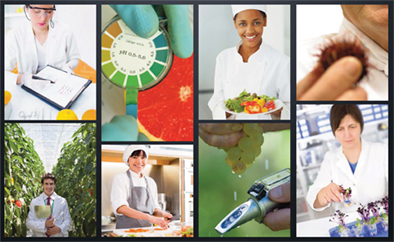Welcome to Blue Book!
Are you ready to join the thousands of companies who rely on Blue Book to drive smarter decisions? View our plans and get started today!
Still have questions? We’d love to show you what Blue Book can do for you. Drop us a line– we’ve been waiting for you.

Miller agrees, and says specialists provide value by contributing to product development and spreading the word about the healthful qualities of fresh produce. This can be done through appearances at stores and trade shows, conducting company tours, and stepping up traditional marketing as well as social media output. “Our recommendations are based in sound science,” she says, and even though some consumers may not fully grasp the role of a dietitian, they are “a trusted and credible authority on food and nutrition.”
“Scientists bring a new perspective and a balanced approach to analyzing issues and providing solutions,” explains Driscoll’s Padda. “Our relationship with researchers in the public sector helps companies do collaborative work with universities. I strongly believe more companies should hire specialists to research current issues relevant to their operations.”
Copas expands on the role of the agronomist and the agricultural specialist in the overall picture: “The benefits of having an agronomist start in the field. No amount of packing-shed magic will make a poor crop better,” he asserts. “Our goal is to improve all aspects of production; if we improve productivity and quality, every step in the chain of custody stands to gain economically.”
His role in the process starts at the beginning, as higher yield and better quality lead to more volume for the grower; healthier yields lead to fewer storage costs; superior product reduces cost and makes the job of the sales team easier; and retailers benefit from increased volume and attracting new customers. Copas predicts an increased need for agronomic support as consolidation continues within the fresh produce industry. “It’s no longer acceptable to deliver the same product you did last year; you must strive to improve, innovate, or be cast aside.”
FINDING THE RIGHT FIT
The return on investment for specialists depends entirely on a company’s needs, the person’s role and training, and the desired results—but once the right fit is found, the upside of hiring experts is clear. Egeland emphasizes the practical additions to her company’s operations, such as building customer loyalty and improving public health. “One of the best ways to connect with your customers is to provide them with the tools to achieve their life and health goals,” she notes. “A registered dietitian can do this whether your customer is a food novice or a self-proclaimed foodie.”
Bussan says most growers might work with an agronomist in some capacity, “few farms have research and development programs, but the trend is increasing nationally. As farms grow and develop and the industry advances, more opportunities will evolve.”
Overdorf offers the following advice when considering whether or not to bring in a specialist: “Identify what’s missing in your current team and operation. As a company, what could you be doing better? What are you being complacent about? What’s outside the collective skill set of your company? Hire someone who can help you develop responses to your deficiencies, and then be willing to listen.” It is also important to “have a definable set of deliverables so both you and your new team member can measure success,” she says.




